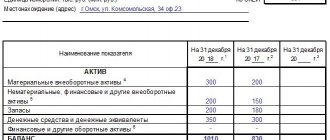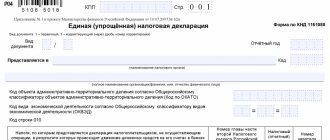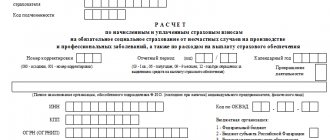Composition of annual financial statements 2020
The annual financial statements of commercial companies must include:
- Balance sheet;
- Statement of changes in equity;
- Cash flow statement;
- explanatory notes to the balance sheet and reports;
- auditor's report - if the organization is subject to mandatory audit.
Statement of financial results (profit and loss statement);
The forms of the balance sheet and the above-mentioned reports were approved by Order of the Ministry of Finance of Russia dated July 2, 2010 No. 66n.
Attention! Insurance and credit organizations have their own reporting forms. For more information about them, see the relevant paragraphs of this reference material.
What happens if you don’t submit your reports on time?
If financial statements are not submitted to the Federal Tax Service of Russia on time, the inspectorate may fine the organization under Article 126 of the Tax Code of the Russian Federation. The fine is 200 rubles. for each document included in the reporting that tax inspectors received late.
When determining the amount of the fine, inspectors are guided by the full list of documents that a specific organization must submit (letter of the Federal Tax Service of Russia dated November 16, 2012 No. AS-4-2/19309, Ministry of Finance of Russia dated May 23, 2013 No. 03-02-07/2 /18285). For example, as part of the financial statements for 2020, the organization must submit the following forms: Balance sheet (see filling out the balance sheet), Statement of financial results, Statement of changes in capital, Statement of cash flows (see ODDS for the procedure for filling out), explanations in tabular and text forms. If an organization fails to submit its financial statements on time, the fine will be 1,000 rubles. (200 rub. × 5).
In addition, for late submission of financial statements at the request of the tax inspectorate, the court may impose a fine in the amount of 300 to 500 rubles from the responsible employee (for example, the head of an organization). (Part 1 of Article 23.1, Part 1 of Article 15.6 of the Code of Administrative Offenses of the Russian Federation).
In each specific case, the perpetrator of the offense is identified individually. In this case, the courts proceed from the fact that the manager is responsible for organizing accounting, and the chief accountant is responsible for its correct maintenance and timely preparation of reports (clause 24 of the resolution of the Plenum of the Supreme Court of the Russian Federation of October 24, 2006 No. 18). Therefore, the chief accountant (an accountant with the rights of the chief) is usually recognized as a violator. And the head of an organization may be found guilty in the following cases:
- the organization did not have a chief accountant at all (resolution of the Supreme Court of the Russian Federation dated June 9, 2005 No. 77-ad06-2);
- accounting was carried out by a specialized organization, and it also compiled reporting (clause 26 of the resolution of the Plenum of the Supreme Court of the Russian Federation of October 24, 2006 No. 18);
- the reason for the violation was a written order from the manager, with which the chief accountant did not agree (clause 25 of the resolution of the Plenum of the Supreme Court of the Russian Federation of October 24, 2006 No. 18).
If you fail to submit financial statements to Rosstat on time or submit them incompletely, an administrative fine will be charged.
An official of an organization faces a fine of 300 to 500 rubles. (to the manager). The organization itself can be fined from 3,000 to 5,000 rubles.
Such sanctions are provided for in Article 19.7 of the Code of the Russian Federation on Administrative Offenses (letter of Rosstat dated February 16, 2016 No. 13-13-2/28-SMI).
Similar separate fines will apply for late submission of an audit report to Rosstat.
Deadlines for submitting annual reports
Article 23 of the Tax Code of the Russian Federation states that organizations are required to submit annual financial statements to the Federal Tax Service no later than March 31 of the year following the reporting year.
If March 31st falls on a Saturday or Sunday, then you can submit reports on the following Monday. In 2020, this day falls on a Friday, so there will be no postponement.
Since you can submit a report in different ways, the question arises of how exactly the date of submission of the report will be calculated:
- If the reporting is sent by mail in a valuable letter with a description of the attachment, this date is considered the day of its mailing. It is indicated on the postmark placed by the postal worker on the inventory of the attachment.
- If the reporting is submitted in person, this date is considered to be the date of its submission. The tax officer must indicate this date on a copy of the reporting or a copy thereof, which remains with the taxpayer. The date is put together with a signature from an employee of the Federal Tax Service, confirming that the tax authority has received a report from the organization.
- If the reporting is submitted electronically, the date of dispatch is considered to be the date indicated in the confirmation of dispatch, i.e. in an electronic document generated by a telecom operator or tax authority.
IMPORTANT! There is no need to submit interim accounting reports (for a quarter or a month) to the tax office.
Deadlines for submitting accounting reports for 2020
The legislator has allowed 3 months after the end of the financial year to prepare accounting reports in both full and simplified form, approve them and submit them to regulatory authorities. Those. All reporting forms for 2020 must be submitted no later than March 31, 2020. But given that this day falls on a Sunday, the last day for submitting financial statements for 2018 will be April 1.
Both in the Federal Tax Service and in the Rosstat department, accounting reports 2018 can be submitted both in paper and electronic format, the number of company personnel does not play a role in this case.
PBU and IFRS
PBU and IFRS are accounting standards. What is the difference?
PBU is an abbreviation for “Accounting Regulations”. These are Russian accounting standards that regulate the accounting of assets, liabilities or events of economic activity. PBUs are internal documents of Russia, they are adopted by the Ministry of Finance of the Russian Federation and are valid for commercial non-banking organizations (for banks and credit organizations, the provisions adopted by the Central Bank of the Russian Federation are used).
Today there are 24 PBUs in force, all of them are mandatory for use when preparing financial statements and maintaining accounting registers.
IFRS is an abbreviation for International Financial Reporting Standards. These standards are adopted by the International Accounting Standards Board (IASB), located in the UK.
IFRS is mandatory for use in some European countries, as well as for almost all European companies whose securities are traded on the stock exchange.
In Russia there is a program for reforming accounting in accordance with IFRS. By Order of the Ministry of Finance of Russia dated November 25, 2011 No. 160n, 63 documents were put into effect in our country: the IFRS standards themselves and explanations to them.
Who must submit financial statements and when?
Any legal entity is obliged to maintain financial statements and submit them to regulatory authorities on time. The rule applies to organizations with any financial results: income, losses, zero results. Firms that did not conduct business are not exempt from reporting. It is worth noting that this obligation does not apply to individual entrepreneurs.
Legal entities submit accounting documents by March 31 of the year following the reporting period. That is, information for 2017 must be provided by March 31, 2018.
Forms of financial statements of commercial organizations
- Balance sheet (form 071001) - consists of 5 sections: Non-current assets, Current assets, Capital and reserves, Short-term and Long-term liabilities. The balance sheet form is filled out line by line, each line contains the indicators as of the reporting date of the reporting period, as of December 31 of the previous year and as of December 31 of the previous year.
- Statement of financial results (report and profit and loss) - form 0710002. It reflects information on the organization’s income and expenses, as well as its profits and losses for the reporting period and the same period of the previous year (this is established in PBU 4/99).
- Statement of changes in capital (form 0710003) - shows the movement of the organization’s capital for the reporting year and the two previous years.
- Cash flow statement (form 0710004) - shows the flow of cash and cash equivalents in the organization for the reporting year and the previous year.
- Explanatory note to the Balance Sheet and the Financial Results Report - these documents can be formatted either as a table or as text. In the case of a table, the organization itself determines the content of these explanations.
All these forms of financial statements, as well as the procedure for filling them out, were approved by Order of the Ministry of Finance of Russia dated July 2, 2010 No. 66n.
Small businesses also use the Balance Sheet and Financial Results Report forms approved by the same order of the Ministry of Finance.
Publicity of financial statements
Since the company’s reporting must be open to all users (participants, creditors, partners, credit institutions, current and potential investors), the legislator in PBU 4/99 (clause 47) established the obligation to publish it.
Organizations whose publication of information about their activities is mandatory include joint-stock companies, credit institutions, insurance companies, LLCs that issue bonds and other securities. The deadline for publication of accounting (financial) statements for 2020 is no later than June 1, 2020.
Accounting report and accounting in a simplified manner
Law 402-FZ on accounting allows some organizations (including small businesses) to maintain accounting records and submit reports in a simplified manner. At the same time, these organizations have the right to prepare financial statements in accordance with the generally established procedure. The corresponding decision is made by organizations independently.
According to a simplified scheme, they can keep records:
- Participants of the Skolkovo project.
- Small businesses.
- Non-profit organizations.
The law specifically stipulates who does not have the right to conduct simplified accounting and submit simplified reporting. This:
- organizations whose financial statements are subject to mandatory audit;
- Housing complexes, housing cooperatives and microfinance organizations;
- credit consumer cooperatives;
- state organizations;
- political parties;
- bar associations, law offices, chambers and consultations;
- notary chambers;
- non-profit organizations performing the functions of a foreign agent.
Accounting and reporting of small businesses
The criteria for classifying companies as small enterprises are specified in Article 4 of Federal Law No. 209-FZ dated July 24, 2007. The main ones: number of employees - no more than 250 people, annual income - no more than 2,000,000,000 rubles, participation share of other legal entities in the authorized capital (there are several options).
Small businesses only submit a Balance Sheet and a Statement of Financial Results. They are also given the right to add financial indicators to the report only for groups of items without detail.
As for the simplified methods of accounting, they are all listed in Information of the Ministry of Finance of Russia No. PZ-3/2015. This:
- Keeping records without double entry.
- Abbreviated chart of accounts.
- Simplified system of accounting registers.
- Possibility not to apply some PBUs.
- Cash method of accounting for income and expenses.
- Valuation of financial investments at their original cost (that is, without subsequent revaluation).
- And some other details.
Accounting and reporting of Skolkovo participants
Accounting and reporting for this category of companies are subject to the same rules that apply to small businesses.
Accounting report of non-profit organizations
Simplified methods of accounting for non-profit organizations are listed in Information of the Ministry of Finance of Russia No. PZ-1/2015 (this letter applies only to non-profit organizations!). They generally repeat the same rules that are established by Information of the Ministry of Finance No. PZ-3/2015 for small enterprises (see above in the text), with some minor changes.
The annual accounting report of a non-profit organization consists of a balance sheet, a report on the intended use of funds and appendices thereto.
The Report on the targeted use of funds discloses information about the receipt of funds by the NPO intended to support its statutory activities, and about the targeted use of these funds in accordance with the approved budget or financial plan. The report also contains data on the balance of these funds at the beginning and end of the reporting period (year).
The form in which NPOs prepare this report can be of two types:
- generally established form 0710006
- simplified form 0710006.
The second, simplified, can be used by those non-profit organizations that keep records according to a simplified scheme (they have the right to do this according to Law 402-FZ).
The first, general one, is used by all others. Or, if desired, “simplified” people can also use it.
Both forms were approved by Order of the Ministry of Finance of Russia dated July 2, 2010 No. 66n.
LLC reporting in 2020
Home / Other
The reporting documentation, which is required to be submitted to the regulatory authorities of a legal entity, can be divided into 5 groups:
- Reporting according to the selected tax regime.
- Reporting for employees (mandatory, since in any organization there is at least one worker - a manager).
- Financial statements.
- Reporting on other taxes.
- Statistical reporting (to Rosstat).
Note: in addition to submitting reports, cash transactions are kept track of, and LLCs using the simplified tax system keep records of income/expenses in KUDiR.
If you don’t want to sort through a bunch of reporting and waste time going to the tax office, you can use this online service, which has a free trial period.
Reporting according to the applicable taxation system
It is submitted to the Federal Tax Service inspection at the place of registration of the legal entity (a separate division of the legal entity / at the place of actual conduct of UTII activities).
| Tax regime | Type of reporting documentation | Report submission deadlines |
| BASIC | VAT declaration | At the end of each quarter until the 25th day of the month (inclusive) following the reporting quarter |
| Income tax return | For the 1st quarter, half-year and 9 months up to the 28th day of the month (inclusive) following the reporting quarter For the year - up to and including March 28 of the next year | |
| Calculations for advance payments and property tax declaration | Calculations are submitted for the 1st quarter, half a year, 9 months up to the 30th day (inclusive) of the month following the reporting quarter Declaration - based on the results of the year until March 30 of the next year inclusive | |
| simplified tax system | Declaration of the simplified tax system | At the end of the year no later than March 31 of the following year |
| UTII | Declaration on UTII | At the end of the quarter no later than the 20th day of the month following the reporting quarter |
| Unified agricultural tax | Declaration on Unified Agricultural Tax | At the end of the year until March 31 of the next year inclusive |
| All special-regime organizations that carry out intermediary activities under agency agreements (commissions, orders) with counterparties on OSNO and receive/register tax invoices with VAT for this type of activity | Journal of received/issued invoices | At the end of the quarter no later than the 20th day of the month following the reporting quarter |
When combining different taxation systems, reporting should be submitted separately for each tax regime applied.
Reporting for employees
Reporting documentation for employees can be divided into 3 categories depending on the authority to which such reporting is submitted: the Federal Tax Service, the Social Insurance Fund and the Pension Fund.
| Type of reporting documentation | Supervisory authority | Submission deadlines |
| Information on the average number of personnel | Inspectorate of the Federal Tax Service | Based on the results of the calendar year, no later than January 20 of the year following the reporting year |
| Unified calculation of insurance premiums (ERSV) | At the end of the 1st quarter, half-year, 9 months and year, no later than the 30th day of the month following the reporting period (quarter) | |
| Form 6-NDFL | Similar to ERSV, with the exception of the annual report - for the year the form is submitted no later than April 1 of the next year | |
| Help 2-NDFL | At the end of the year no later than April 1 of the year following the reporting year | |
| Form SZV-M | Pension Fund | Monthly before the 15th day of the month following the reporting month |
| Forms: SZV-STAZH, EDV-1 | At the end of the year until March 1 of the year following the reporting year When an individual submits an application for retirement - within 3 days from the moment the person contacts the employer | |
| Calculation 4-FSS | FSS | Based on the results of the 1st quarter, half year, 9 months and year. Until the 20th day (inclusive) of the month following the billing period (when the form is submitted on paper), or until the 25th day of the month following the billing period (when submitted electronically) |
| Application and certificate confirming the main type of activity | Annually before April 15 of the year following the reporting period |
Financial statements
All companies are required to annually submit accounting reports to the Federal Tax Service at the place of registration, regardless of the tax regime used and the number of hired personnel.
Accounting reports are submitted at the end of the calendar year no later than March 31 of the year following the reporting year.
The number of forms submitted depends on the category of the organization.
Small enterprises (staff - up to 100 people, revenue up to 800 million rubles per year) rent out:
- balance sheet (form 1);
- statement of financial results (form 2).
Note: such reporting can be presented in both standard and simplified forms.
All other organizations (medium, large, largest taxpayers) additionally represent:
- statement of changes in capital (form 3);
- cash flow statement (form 4);
- report on the intended use of funds (form 6);
- explanations to the financial statements in text or tabular form.
Reporting on other types of taxes
Some enterprises, by type of activity, are subject to additional taxation and, accordingly, must report to the Federal Tax Service on the following taxes and fees:
| Tax/fee | Reporting type | Submission deadlines |
| Transport | Transport tax declaration | Based on the results of the year, no later than February 1 of the following year |
| Water | Water tax declaration | Based on the results of each quarter no later than the 20th day of the month following the billing quarter |
| Land | Land tax declaration | At the end of the year no later than February 1 of the following year |
| Excise | Excise tax declaration | Monthly until the 25th day of the next month (for straight-run gasoline and denatured alcohol: until the 25th day of the third month following the billing month) |
| Notice of advance payment and copies of payment documents | No later than the 18th of the current month | |
| For the gambling business | Gambling tax return | At the end of each month no later than the 20th day of the next month |
| For mining | Declaration on mineral extraction tax | Every month no later than the last day of the next month |
| Regular payments for subsoil use | Calculation of payments for subsoil use | Quarterly no later than the last day of the month following the billing quarter |
| Fee for the use of water resources | Information about issued permits and fees payable | Within 10 days from the date of issue of the permit |
| Information on the number of objects removed from the habitat | No later than the 20th day of the month following the last month of the permit validity period | |
| Fee for the use of wildlife objects | Information on issued permits for the extraction of animals | Within 10 days from the date of issue of the permit |
Statistical reporting
All companies are required to submit to Rosstat a copy of their annual financial statements (including a statement of financial results and other appendices, if any) no later than three months from the end of the reporting year.
Firms belonging to the category of small enterprises that came under selective observation, as well as companies belonging to the sector of medium, large and largest businesses, must submit statistical reporting in forms approved by Rosstat.
Statistical authorities are obliged to inform companies about the need to submit reports by sending out relevant notifications. You can check which statistical reports an organization must submit yourself on the website: statreg.gks.ru
If a company must report to Rosstat, the following information will be displayed on the website:
- a list of reports to be submitted;
- deadlines for their submission;
- instructions for filling out reporting documentation.
All small enterprises also submit reports to Rosstat as part of continuous monitoring, which is carried out once every 5 years. The next total audit will take place in 2020; accordingly, all small business representatives will have to report to the statistical authorities in 2021.
Read in more detail: All LLC reporting
Did you like the article? Share on social media networks:
- Related Posts
- New form 2-NDFL in 2020
- Liquidation of an LLC in 2020: step-by-step instructions
- Book of accounting of income and expenses (KUDiR) in 2020
- Individual entrepreneur reporting in 2020
- Personal income tax for employees (income tax)
- Taxes and payments for individual entrepreneurs in 2020
- Tax holidays for individual entrepreneurs in 2020
- Insurance premiums for employees in 2020
Discussion: 4 comments
- Vasily Alekseev:
02/16/2018 at 09:30Helpful information. Thank you, but Rosstat employees need to familiarize themselves with it.
Answer
- Nikolay:
12/25/2019 at 06:12
What about Rosprirodnadzor reporting? To whom should I submit which reports and in what time frame?
Answer
- Nikolay:
02/06/2020 at 13:55
6-NDFL and 2-NDFL for 2020 must be submitted by March 2, 2020. And not until 04/01/20 as indicated in your article. Federal Law of September 29, 2019 N 325-FZ “On Amendments to Parts One and Two of the Tax Code of the Russian Federation”
Answer
- egrul:
06/02/2020 at 09:47
Yes, now it’s easy to submit reports using an electronic digital signature for reporting. Just be sure to specify this when ordering a signature! Because without a special certificate for the father. nothing will come of it. Costs 3500-5000 on average. There are even signatures with which you can report directly from 1C (and not necessarily licensed))). If anyone needs help, ask. I’ll be happy to help, there’s a nickname in the cart...
Answer
Leave a comment Cancel reply
Accounting statements of budgetary organizations
The reporting of budgetary, autonomous and government institutions is regulated by separate regulations. It differs from the reporting of commercial companies. Moreover, this reporting is also different for different types of budgetary institutions, although it has similar principles and features.
Budgetary and autonomous institutions draw up and submit financial statements in accordance with the Instructions on the procedure for compiling and submitting annual and quarterly financial statements of state (municipal) budgetary and autonomous institutions, approved by Order of the Ministry of Finance of Russia dated March 25, 2011 No. 33n.
government institutions are guided by another document - the Instruction on the procedure for compiling and submitting annual, quarterly and monthly reports on the execution of budgets of the budget system of the Russian Federation, approved by Order of the Ministry of Finance of Russia dated December 28, 2010 No. 191n.
General reporting requirements for budgetary, autonomous and government institutions are as follows:
- Reporting is prepared based on the results of the calendar year.
- The data reflected in the statements must be confirmed by the results of the inventory of assets and liabilities.
- The report must be signed by the manager and chief accountant and can be submitted both on paper and electronically.
Reporting must be submitted in the following forms:
- Institutional balance sheet (form 0503730 - for budgetary and autonomous, form 0503130 - for government institutions)
- Certificate on consolidated settlements (form 0503710 - for budgetary and autonomous, form 0503125 - for government institutions)
- Certificate for the conclusion of budget accounting accounts (form 0503725 - for budgetary and autonomous, forms 0503110 and 0503111 - for government institutions)
- Report on the execution of the plan/budget (form 0503737 - for budgetary and autonomous, forms 0503127, 0503317 and 0503117 - for government institutions)
- Report on the obligations assumed by the institution (form 0503738 - for budgetary and autonomous, form 0503128 - for government institutions)
- Report on financial results of activities (form 0503721 - for budgetary and autonomous, form 0503121 - for government institutions)
- Explanatory note (form 0503760 - for budgetary and autonomous, form 0503160 - for government institutions)
- Certificate of amounts of consolidated revenues to be credited to the budget account (form 0503184 - only for government institutions)
- Balance of budget execution (form 0503120 - only for government agencies)
- Cash flow statement (form 0503123 - only for government institutions)
- Report on cash receipts and outflows of funds (form 0503124 - only for government institutions)
- Separation balance sheet (form 0503230 - only for government institutions)
- Consolidated statement of financial results (form 0503321 - only for government institutions)
- Consolidated cash flow statement (form 0503323 - only for government institutions)
Accounting statements of banks and credit organizations
The accounting statements of banks and credit institutions are special. It is regulated by the regulatory documents of the Bank of Russia. The fundamental documents are the “Regulations on the rules of accounting in credit institutions located on the territory of the Russian Federation” (approved by the Bank of Russia on July 16, 2012 No. 385-P) and the Bank of Russia Directive dated September 4, 2013 No. 3054-U “On the procedure for drawing up credit organizations annual accounting (financial) statements.” Attention!
New reporting forms for banks were established by Bank of Russia Directive No. 4212-U dated November 24, 2016, which canceled the previously effective Bank of Russia Directive No. 2332-U dated November 12, 2009.
New reporting forms include:
- 0409120 “Data on the risk of information for calculating the amount of participation of foreign capital in the total authorized capital of credit institutions licensed to carry out banking operations”;
- 0409702 “Information on unexecuted transactions”, developed for the purpose of maintaining statistics and operational monitoring of systemic risks of the financial system associated with the non-execution of certain types of transactions in financial markets.
The requirements for the formation of indicators of reporting forms and the procedure for their submission to the Bank of Russia are also clarified.
Annual reporting of banks is compiled based on the results of the calendar year. It is subject to mandatory audit. The auditor's report is submitted along with the annual report to the Bank of Russia.
Audit of financial statements
In a number of cases, the law establishes that an organization is required to conduct an audit of its financial statements. The list of cases when this is mandatory is established by Federal Law No. 307-FZ of December 30, 2008 “On Auditing Activities”. In particular, an audit is required:
- for all JSC (joint stock company);
- for companies whose securities are admitted to organized trading;
- for credit institutions, funds, securities market participants, insurance and clearing companies;
- for gambling organizers and lottery operators;
- for SROs (self-regulatory organizations);
- for state companies and corporations;
- for a number of specific companies (Rostec, Rosatom, Deposit Insurance Agency, Roscosmos, etc.);
- and also if the volume of revenue from the sale of products (goods, works, services) of the organization for the previous reporting year exceeds 400 million rubles or the amount of balance sheet assets as of the end of the previous reporting year exceeds 60 million rubles;
The auditor's report is not included in the annual financial statements, but is attached to it. The organization is obliged to submit the audit report to the state statistics body and publish it along with its annual reports.
Inventory
Before preparing annual financial statements, the organization is required to conduct an inventory. This obligation applies to all companies, regardless of their tax regime or legal form. The purpose of inventory is to ensure the reliability of accounting data and financial statements. To do this, during the inventory, the presence, condition and assessment of the organization's assets and liabilities are checked and documented.
This inventory is planned. To carry it out, the manager must approve the inventory regulations. The timing of such an inventory is from January 1 to December 31 of the reporting year.
An annual inventory is carried out on all assets and liabilities of the company, the verification is complete.
There are other reasons for conducting an inventory, unscheduled. They are established by the Regulations on accounting and financial reporting, Federal Law 402-FZ and PBU 4/99). This:
- change of financially responsible persons;
- identification of facts of theft, abuse or damage to property;
- natural disasters, fire or other emergencies;
- liquidation or reorganization of an organization.
Inventory procedure
- Step 1. Creation of an inventory commission
- Step 2. Receiving the latest incoming and outgoing documents
- Step 3. Receiving a receipt from the financially responsible person
- Step 4. Preparation of inventory records (acts)
- Step 5. Verification and documentary evidence of the presence, condition and valuation of assets and liabilities
- Step 6. Summarizing the results identified by the inventory
- Step 7. Approval of inventory results
- Step 8. Reflection of inventory results in accounting
You can read more about these stages in the “Practical guide to annual financial statements 2016” of the Consultant Plus system.
When to submit a balance sheet if the reporting period is shortened or extended
Typically the reporting period is one year. During this time, you need to draw up a balance sheet and submit it to all authorities within the established time frame.
But you can register and start working from any date within the calendar year, and then the reporting period will be shorter than traditional. At the same time, the deadline for preparing the balance sheet is usual: within 3 months after the end of the reporting period.
Another case is the liquidation of a company. For such a company, the reporting period ends with the date of entry into the Unified State Register of Legal Entities on liquidation (Article 17 of Law No. 402-FZ), and the same 3-month period applies for the preparation and submission of reports.
For more information about where the liquidation balance sheet is submitted, read the material . ”
An extended reporting period occurs when the decision to start a business is made at the end of the year and registration occurs after September 30 (for example, in October 2020). Then, according to paragraph 3 of Art. 15 of Law No. 402-FZ, the reporting period increases and lasts from October 1, 2020 to December 31, 2020. Such an increase does not affect the deadline established by law for submitting the balance sheet.
We prepare an annual report with Consultant Plus
The developers of the legal reference system Consultant Plus traditionally publish an annual analytical material, “A Practical Guide to Annual Accounting Reports.” This material usually includes very detailed explanations about the formation of an accounting report for the year, with examples, comments, samples of filling out document forms, etc.
The unique tool contained in this material, the “Interconnection of indicators” section, will help you once again check your finished report for the correctness of the details.
Read more about the Practical Guide to the Annual Report from Consultant Plus.







